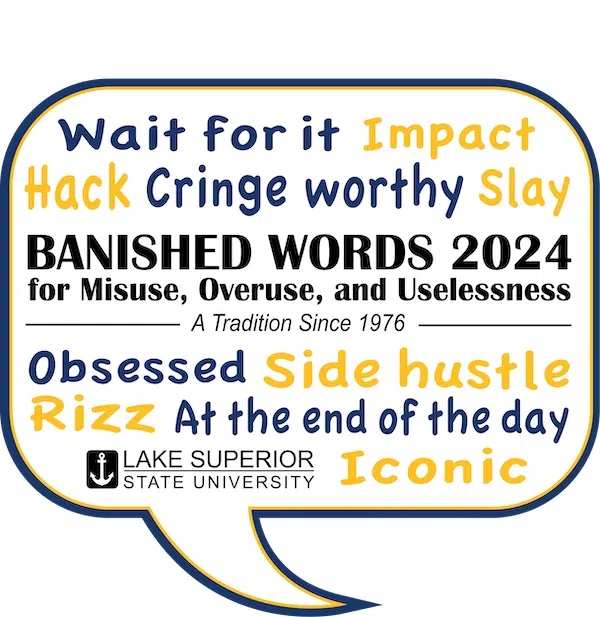As the new year inspires us to look ahead to the future, it also gives us time to reflect on the past. Lake Superior State University (LSSU) proudly unveils this year’s Banished Words List, a lively tradition that began in 1976.
This tradition highlights certain words that are often misused, overused, or have lost their meaning over the past year. It encourages us to laugh at ourselves as we reconsider and reflect on the importance of our vocabulary.
Language is a dynamic, ever-evolving entity. The banished words list recognizes the rapid changes in expression, encouraging a reassessment of the impact and relevance of our vocabulary. We think you will find this year’s submissions truly cringe-worthy.
“This season is marked by various joyful traditions, and the Banished Words List remains one of the most iconic, humorous, and quirky traditions in the region,” expressed Sheridan Worth, Director of Marketing at Lake Superior State University.
“The tradition provides a lighthearted opportunity to pause and reflect on the past year—our experiences, communication styles, and the phrases we commonly use. At the end of the day, it serves as a platform for considering how we can progress into the new year with a more mindful approach to language,” stated Worth.
LSSU received over 2,000 nominations from around the world, including submissions from Australia, Bangladesh, Belgium, Canada, China, Croatia, Germany, Guam, Ireland, Lebanon, Namibia, New Zealand, Pakistan, Singapore, Switzerland, Thailand, Uganda, Ukraine, the United Kingdom, with the majority coming from the United States.
Here is the list of the banished words and terms for 2024 and the reasons for their banishment:
1. Hack
The term “hack” has increasingly become a popular buzzword, frequently utilized to impart an aura of innovation or sophistication to various subjects. Its widespread adoption in multiple contexts, extending beyond its initial technological context, has the potential to lessen its inherent significance. Using it everywhere, even beyond its tech roots, could make it lose its magic.
2. Impact
Especially as a verb, why use this word when we have a perfectly good word that makes more sense: “affect”? Overusing it not only takes away its pizzazz but also robs other words of their spotlight.
3. At the end of the day
Sometimes a word needs to be re-banished, and this is one of them. Many comments note that it is overused and meaningless, often employed as a rhetorical device that attempts to encapsulate the complexities of a situation summarily, lacking nuance and depth.
4. Rizz
Rizz, derived as a shortened form for “charisma,” gained prominence as Oxford’s word of the year and has become a familiar presence in the realm of social media discourse. The ubiquity of this term prompts contemplation on whether it retains its relevance. With language doing the cha-cha of change, we’re wondering if this word still rocks the charisma scene or if it’s time for a language remix.
5. Slay
While perfectly acceptable in specific contexts, “slay” has transcended its original meaning and infiltrated situations where its usage no longer aligns with its intended significance. Its transition from a specialized term denoting exceptional accomplishment to a commonplace expression for any achievement prompts scrutiny into its misapplication, particularly in the characterization of routine or mundane actions. Now, it’s sprinkled everywhere—from wearing a stylish outfit to tackling the art of parallel parking.
6. Iconic
This one appeared on the list in 2009, so perhaps it’s time for another attempt to point out its overuse and lack of meaning in most situations. Despite its initial recognition as a word worthy of distinction, its repeated application in contexts that don’t merit such acclaim challenges its genuine iconic status. It’s like that one-hit wonder playing on loop.
7. Cringe-worthy
From the comments: “The use of this term is cringe-worthy.” The irony is served hot, as the very term “cringe-worthy” finds itself under the spotlight. It’s like a word caught in its own cringe-worthy moment. Now, as we usher in the new year, it’s time to decide if this linguistic drama deserves an encore or if we should bid “cringe-worthy” adieu to make room for fresh, less cringe-inducing expressions in 2024.
8. Obsessed
The use of this word for things that are not truly being obsessed over makes it a good candidate for rethinking how we use the word. The casual use of “obsessed” to describe routine interests or preferences underscores a potential misappropriation of the term, prompting a reconsideration of its application. Should one be obsessed with a new kitchen gadget or a new shade of paint? This year’s contributors think not.
9. Side hustle
The term “side hustle” has gained widespread use, prompting considerations about its impact on how we perceive economic challenges. It may be worth reflecting on whether its prevalence inadvertently downplays the genuine reality of the situation. While ‘side-hustle’ adds flair to our language, our contributors feel that the only hustle is the one needed to get to their second job.
10. Wait for it
If we’re watching the video, then we’re already waiting for it, right? While “wait for it” is trying to be the hype master, let’s question if it’s adding extra sparkle or just stating the obvious?
Concluding the 48th year of this tradition, bidding farewell to banished words reflects our collective awareness of language’s constant evolution. The Banished Word list acknowledges the swift changes in modern communication, encouraging a tongue-in-cheek reassessment of our vocabulary’s impact.
As we part ways with words and phrases that have overstayed their welcome and enter a new era, let the banishment be a reminder of language’s dynamic nature and the joy found in embracing its ever-evolving landscape.
For more about LSSU’s Banished Words List and to nominate a word or term for banishment for 2025, visit https://www.lssu.edu/traditions/banishedwords/.






















Comments